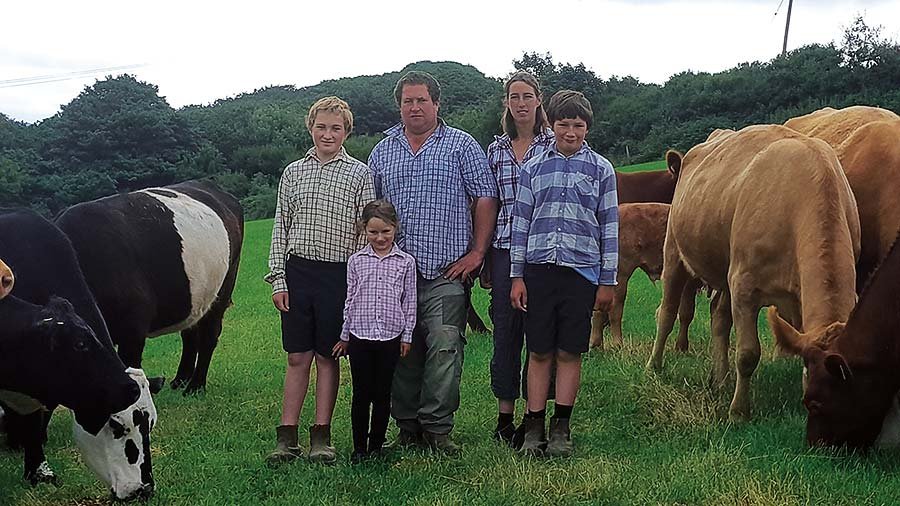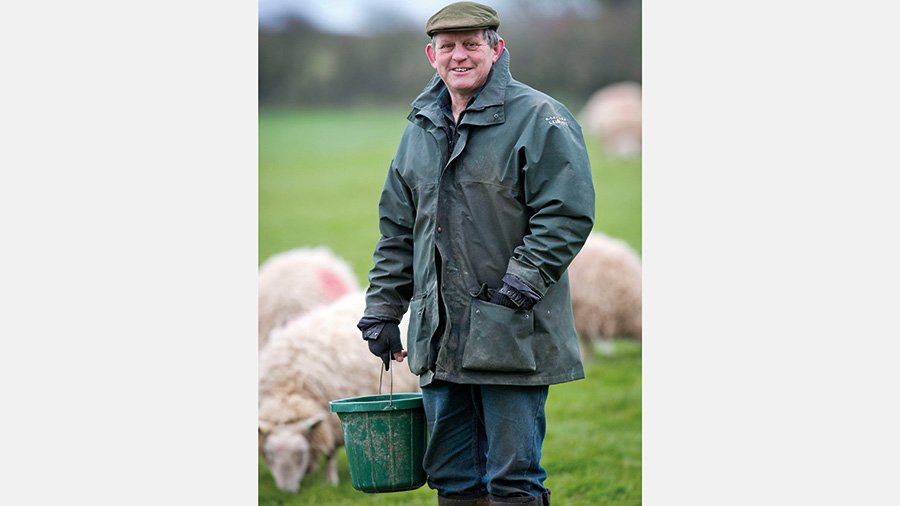Several farming tenants and the Tenant Farmers Association (TFA) are concerned by what they see as the over-zealous way in which the National Trust is taking productive agricultural land back in-hand for rewilding.
Farmers Weekly talks to some tenants who have lost the land they have farmed for years.
See also: Why farm tenants are criticising National Trust landlords
Devon farmer leaves after 28 years
Patrick Greed, who farms on the Killerton Estate in Devon, feels he has “betrayed agriculture” after accepting an incentive from the National Trust to give up his Agricultural Holdings Act (AHA) tenancy after 28 years.
As well as the main 160ha holding he farmed, he had another 60ha of river meadow grazing on a Farm Business Tenancy (FBT).
“The National Trust kept renewing it every five or 10 years, depending upon what environmental stewardship schemes we were in,” he says.
“Most recently, we had been in Higher Level Stewardship and once that ended, they decided to take it back for tree planting, scrapes and rewilding.”
Loss of this land meant 61-year-old Mr Greed had to reduce his Limousin suckler herd. “We had 550 head (cows and followers) before we lost the river meadows. Now we have 340.”
Mr Greed’s pedigree limousin © Patrick Greed
With it becoming increasingly difficult to farm the land productively, alongside TB risks and greater public use of the land, Mr Greed accepted the incentive to quit and will leave the farm next year.
But he is uneasy about the direction the National Trust is taking.
“It is not reletting it as a farm. It plans to do a lot of tree planting on the main holding. But just over 120ha of it is Grade 1 and 2 arable land.
“It [the National Trust] even wants to plant trees on some of the permanent pasture. It is wrong. Farmers ought to be producing as much food as possible from this land.”
Mr Greed is not alone. Land agent Kevin Bateman, director of Bateman Hosegood, has come across numerous cases, particularly in the past two years, where the National Trust has taken back tenanted land for rewilding and tree planting.
“It feels like re-enactment of the Highland clearances – a land grab,” he says.
Typically, tenants are finding that their FBTs, which have been historically renewed, are being taken back in-hand, which is significantly affecting the viability of some businesses.
“And some tenants with AHA tenancies are being offered cash incentives to give them up too, says Mr Bateman.
“The policy feels like it is financially driven, with the trust targeting big grants for landscape-scale nature recovery at the expense of its tenanted farms.
It sees this as a way of creating significant income for itself. However, it does not understand the implications for the farming businesses and family homes that it is effectively destroying,” he explains.
“The way it is doing this suggests that it has complete contempt for the farmers who have farmed the land for generations.”
Cornwall farmer feels ‘destroyed’
When Tom Hasson, 42, and his partner Becki Prouse, 37, took on the 220ha mixed farm FBT in Stowe Barton, Cornwall seven years ago – having farmed 60-80ha of it for 14 years – they fully expected to continue.

Tom Hasson and family © Tom Hasson
“When we took it on, the National Trust said it wanted to let it to a young farming family like us. In June last year, we went with a proposal to renew our Mid-Tier stewardship and tenancy,” says Mr Hasson.
“So it came as a bombshell when the trust said it had different plans for the premises. It wanted to take all the land back and create a nature reserve with agricultural production as a ‘by-product’ rather than the main aim.”
At their last meeting, the National Trust suggested running 50 head of cattle over 220ha on a year-to-year grazing licence.
“But there would be no security and how could we get an income when they would be taking the payments? Our plans are up in the air,” says Mr Hasson.
“It has totally destroyed us and upset the kids.” Ms Prouse agrees: “There is no recognition of what we have done. I feel empty.”
Devon farm goes to public access
Echoing this sentiment is Tim Jankins, who came out of his 180ha mixed farm FBT on the South Devon Estate, near Plymouth, in November last year.

Tim Jakins © Moostones
“We were there for 25 years. The National Trust approached us in 2018 when our tenancy was up for renewal and said we couldn’t renew it on the previous terms,” he says.
“It wanted a large amount of public access, and to rewild some of it.
“My gut reaction told me to get out. I’d put a lifetime’s savings into it and I didn’t want to be there when it reverted back to whatever it was supposed to be reverting back to.”
He has since heard that the farmhouse is empty and that there are many weeds on the farm. “It is good, productive land,” he adds.
“We used to supply a good amount of beef and lamb, with grain going to local feed mills. This now has to be brought in from further away, which doesn’t help the carbon footprint.”
TFA: ‘Wrong-headed’ policy
Tenant Farmers Association (TFA) chief executive George Dunn says that what is happening to some tenants is devastating.
“They have put their heart and soul into a place, hoping to get some sort of tenancy renewal and are told this is not going to happen.
“People are bringing up families on these farms, they are involved in local communities and go to local schools.”
While he is aware of conversations on other National Trust estates, Mr Dunn says the situation is most potent in the South West, particularly affecting coastal properties.
“The Trust is focusing attention on what it considers is needed for biodiversity net gain and carbon reduction. It doesn’t see these farms as particularly important from an agricultural perspective.”
The TFA thinks the policy is entirely wrong-headed. “It is a vanity project driven by the current media frenzy around rewilding, which in our view is not based on sound science,” says Mr Dunn.
The TFA is also challenging Defra over spending public money on such projects.
“The government’s objective is to maintain the landlord/tenant system in agriculture.
“If a landlord like the National Trust decides to bring someone’s occupation of a farm to an end, it shouldn’t have access to public funding for planting trees and rewilding,” Mr Dunn suggests.
He advises tenants who have been approached about giving up their tenancy not to go quietly and to speak up for what they believe to be right.
“Contact the TFA,” he adds. “We are building a database to help lobby the National Trust on a joint basis – the more cases we have, the better.”
National Trust insists it values its tenants
The National Trust says it wants to make its land “better for nature”, to help tackle the nature and climate crisis.
“We want to create and restore 25,000ha for nature on our land by 2025 – work started in 2017. This means we may retain land in-hand, often temporarily, to reset the management model,” says a spokesman.
Any payments made as incentives to surrender tenancies are from National Trust funds, and each case is considered in its local context.
The trust denies taking land back so it can claim future Landscape Recovery or other environmental grants.
“If we hold land in-hand, it is with a view to taking some time to plan its future use and management,” the spokesman explains.
“When we decide to make changes to our land, we look at the different options available to support any capital investments needed and to secure appropriate long-term management.
“We anticipate future funding will come from a variety of sources and that rental income will continue to be part of that mix.”
The National Trust says it is acutely aware of the impact on tenants when tenancies are not renewed. “We work hard to support our tenants with the challenges they face as a result of this,” it insists.











